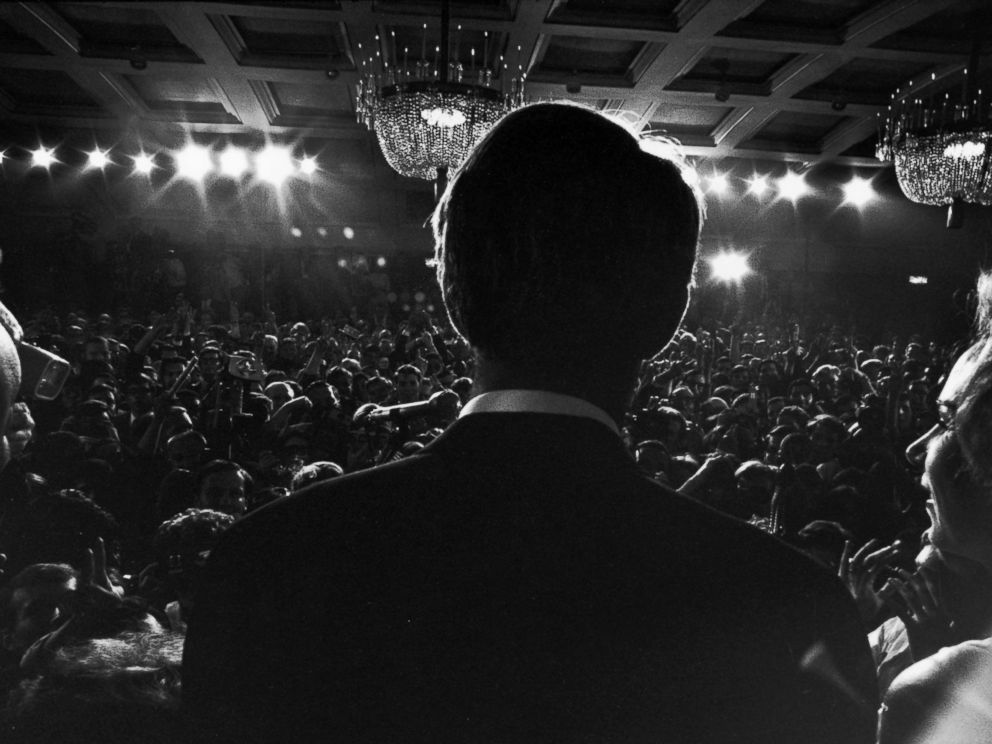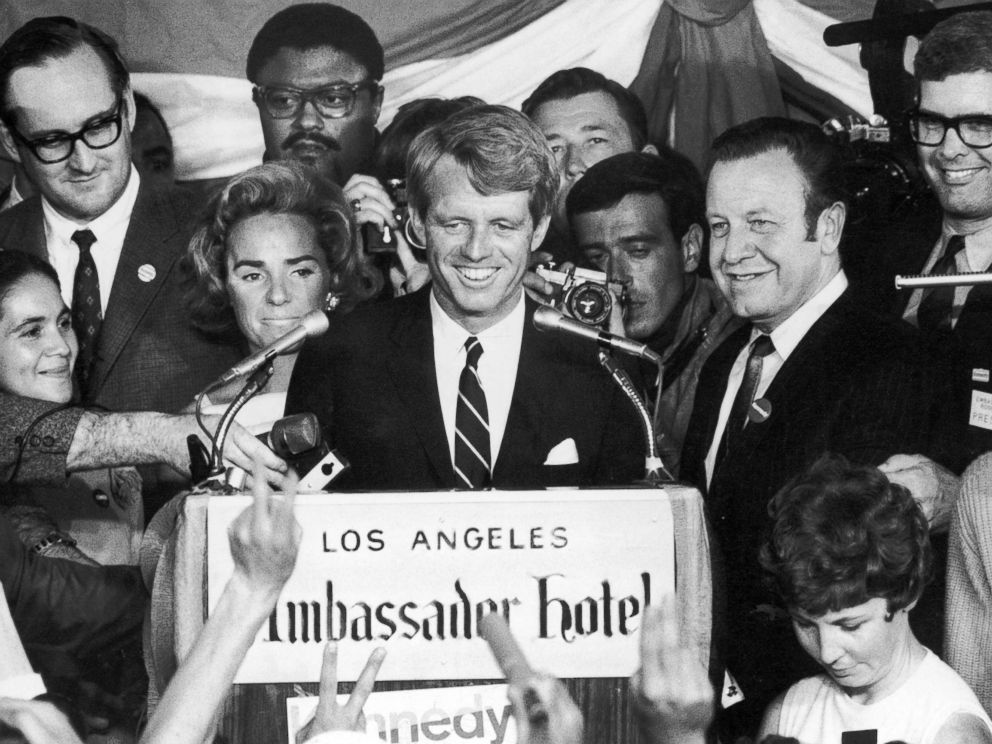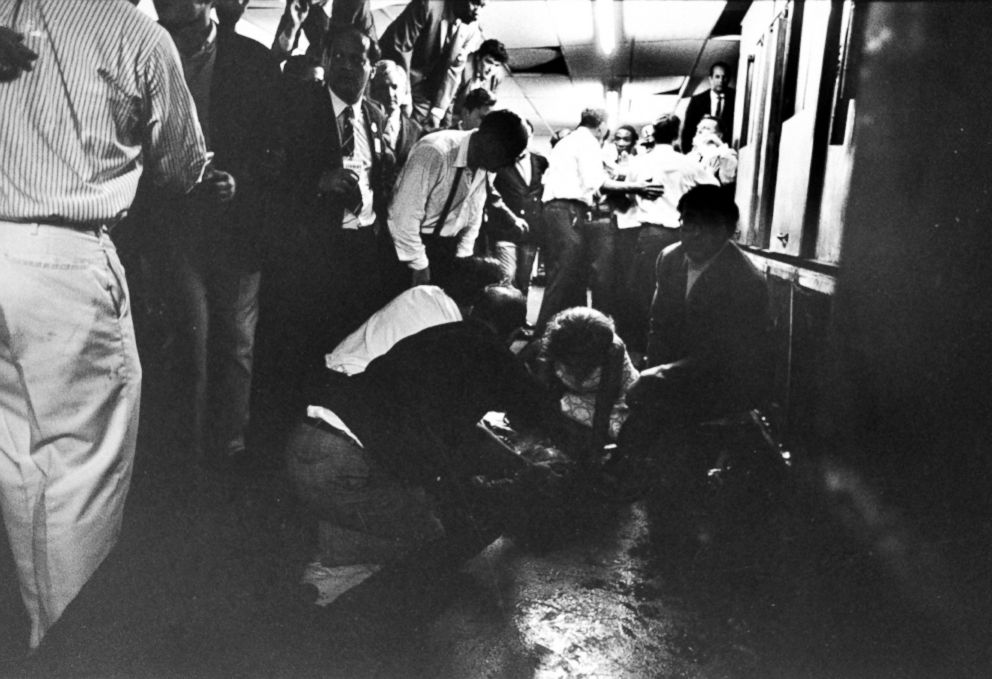Deafening chants of "We want Bobby!" filled the stifling Embassy Room of the Ambassador Hotel in Los Angeles around midnight on June 5, 1968, as New York Sen. Robert Francis Kennedy weaved his way across a jam-packed stage.
When he finally reached the microphones, they weren't working.
"Can we get something that works?" the senator shouted to his aides in a Boston Brahmin accent that reminded many in the ballroom of his assassinated brother, the 35th president of the United States who challenged America to "choose to go to the moon."
He had arrived in the ballroom to declare victory in the California Democratic presidential primary, beating Minnesota Sen. Eugene McCarthy by a narrow voting margin of 46 percent to 42 percent.

Rear view of Sen. Robert Kennedy and his pregnant wife Ethel standing at a podium at the Ambassador Hotel
The win was a prized milestone for Bobby Kennedy in what was still an uphill battle for the Democratic nomination for president, a journey that got a late jump on March 16, 1968, when he announced his candidacy in the Senate Caucus Room of the Capitol Building in Washington, the same venue where his brother, John F. Kennedy, launched his successful presidential bid in January 1960.
"I run because I am convinced that this country is on a perilous course and because I have such strong feelings about what must be done, and I feel that I'm obliged to do all I can," the 42-year-old Kennedy, who had served as U.S. Attorney General in his brother's administration, said as he pitched his hat into the ring for the nation's highest office.
Five decades after Kennedy emerged as a beacon of hope to millions of young Americans disenchanted by a war half a world away and disintegrating race relations at home in the chaotic aftermath of Rev. Martin Luther King Jr.'s assassination, many questions about his death remain unanswered. His eldest son and namesake now says he firmly believes his father's real killer eluded arrest and the case needs to be reinvestigated.
I was disturbed that the wrong person might have been convicted of killing my father," Robert F. Kennedy Jr., 64, an environmental attorney and activist, told The Washington Post last month. "My father was the chief law enforcement officer in this country. I think it would have disturbed him if somebody was put in jail for a crime they didn't commit."
RFK Jr., who was just 14 when his dad was killed, said he reached the conclusion that a second gunman got away after visiting for three hours late last year with his father's convicted assassin. He is renewing calls to reopen the homicide case, a request he first made in a 2012 letter to U.S. Attorney Eric Holder and presented to the California Department of Corrections Board of Parole in 2016 at convicted killer Sirhan Sirhan's 15th unsuccessful parole hearing.
While there is little doubt Sirhan wounded Kennedy and five others, some of the major questions about one of the most public homicides in U.S. history persists today:
-- Why did forensic scientists studying audio of the shooting hear 13 shots when Sirhan's gun only held eight bullets and he had no time to reload?
-- How could Sirhan have killed Kennedy when he was standing in front of him when he fired his weapon, while the autopsy report shows the fatal point-blank shot entered RFK's skull behind his right ear?
-- But the biggest question can never be answered. Had he been elected president, could Kennedy have realized his ambition to unite a country divided on many fronts, end poverty and foster race and economic equality?
Campaign gets late start
When Robert Kennedy started his campaign, President Lyndon Johnson, who had been his brother's vice president and former Senate Majority Leader, was still expected to seek reelection. But when Johnson stunned the country on March 31, 1968, in a televised announcement that he would not run, Kennedy's quest to succeed him skyrocketed.
He won primaries in Indiana, South Dakota, Nebraska and Washington, D.C. By the night of his victory in California, he had become a viable challenger to be his party's nominee. But it was not a sure thing. Sitting Vice President Hubert Humphrey, the favored candidate of the Democratic Party machine, stood in his way as the countdown to the Democratic National Convention in Chicago got underway.

As Kennedy finally found a working microphone at the Ambassador Hotel that Wednesday, the first person he mentioned, surprisingly, was Don Drysdale, the All-Star pitcher for the Los Angeles Dodgers.
"I want to express my high regard to Don Drysdale, who pitched his sixth straight shutout tonight and hope that we have as good fortune in our campaign," a smiling Kennedy said as supporters cheered loudly.
Kennedy appeared jovial, his optimistic mood added even more electricity to an already electrified crowd as he thanked those who worked on his California campaign. His wife, Ethel, three months pregnant with their 11th child, stood next to him.
The candidate joked that he wanted to "express my gratitude to my dog, Freckles, who has been maligned," he said, referring to the criticism he had received for taking his beloved English springer spaniel on the campaign trail with him. "As Franklin Roosevelt said, 'I don't care what they say about me, but when they start to attack my dog...'"
Later in the speech, Kennedy -- who had become a critic of the Vietnam War, a conflict he admitted helping prolong as his brother's most trusted White House adviser, and had made combating poverty and racial inequality cornerstones of his campaign -- turned serious.
"What I think is quite clear is that we can work together in the last analysis and that what has been going on in the United States over the last three years, the divisions, the violence, the disenchantment with our society, the divisions whether it's between blacks and whites, between the poor and the more affluent, or between age groups or on the war in Vietnam, that we can start to work together," Kennedy said.
"We are a great country, an unselfish country, a compassionate country. And I intend to make that my basis for running," he said. "So, my thanks to all of you, and now it's on to Chicago and let's win there."
Cheers turn to horror
The time was 12:15 a.m. when Kennedy left the stage to euphoric cheers and more chants of "Kennedy! Kennedy! Kennedy!" and "RFK!"
He was led off the stage and through a door to the pantry where surprised kitchen workers clamored to meet him. He was leaning over a counter shaking hands with 17-year-old busboy Juan Romero when a man armed with an eight-shot, .22-caliber Iver-Johnson revolver charged up to Kennedy and opened fire.
RFK, according to the Los Angeles County Medical Examiner's autopsy report, was hit three times. One bullet grazed his forehead, another penetrated his neck, and the third entered behind the right ear and smashed through his skull.
The path of the fatal bullet, according to the autopsy report, traveled through the "skin of [the] right mastoid region" and continued through the "right mastoid, petrous portion of right temporal bone, right temporal lobe, right cerebellum, and brain stem."
Five other people, including Paul Schrade, the regional director for the United Auto Workers, and a close friend of Kennedy, and William Weisel, a retired ABC News associate director, were wounded by the gunfire.
When he finally reached the microphones, they weren't working.
"Can we get something that works?" the senator shouted to his aides in a Boston Brahmin accent that reminded many in the ballroom of his assassinated brother, the 35th president of the United States who challenged America to "choose to go to the moon."
He had arrived in the ballroom to declare victory in the California Democratic presidential primary, beating Minnesota Sen. Eugene McCarthy by a narrow voting margin of 46 percent to 42 percent.

Rear view of Sen. Robert Kennedy and his pregnant wife Ethel standing at a podium at the Ambassador Hotel
The win was a prized milestone for Bobby Kennedy in what was still an uphill battle for the Democratic nomination for president, a journey that got a late jump on March 16, 1968, when he announced his candidacy in the Senate Caucus Room of the Capitol Building in Washington, the same venue where his brother, John F. Kennedy, launched his successful presidential bid in January 1960.
"I run because I am convinced that this country is on a perilous course and because I have such strong feelings about what must be done, and I feel that I'm obliged to do all I can," the 42-year-old Kennedy, who had served as U.S. Attorney General in his brother's administration, said as he pitched his hat into the ring for the nation's highest office.
Five decades after Kennedy emerged as a beacon of hope to millions of young Americans disenchanted by a war half a world away and disintegrating race relations at home in the chaotic aftermath of Rev. Martin Luther King Jr.'s assassination, many questions about his death remain unanswered. His eldest son and namesake now says he firmly believes his father's real killer eluded arrest and the case needs to be reinvestigated.
I was disturbed that the wrong person might have been convicted of killing my father," Robert F. Kennedy Jr., 64, an environmental attorney and activist, told The Washington Post last month. "My father was the chief law enforcement officer in this country. I think it would have disturbed him if somebody was put in jail for a crime they didn't commit."
RFK Jr., who was just 14 when his dad was killed, said he reached the conclusion that a second gunman got away after visiting for three hours late last year with his father's convicted assassin. He is renewing calls to reopen the homicide case, a request he first made in a 2012 letter to U.S. Attorney Eric Holder and presented to the California Department of Corrections Board of Parole in 2016 at convicted killer Sirhan Sirhan's 15th unsuccessful parole hearing.
While there is little doubt Sirhan wounded Kennedy and five others, some of the major questions about one of the most public homicides in U.S. history persists today:
-- Why did forensic scientists studying audio of the shooting hear 13 shots when Sirhan's gun only held eight bullets and he had no time to reload?
-- How could Sirhan have killed Kennedy when he was standing in front of him when he fired his weapon, while the autopsy report shows the fatal point-blank shot entered RFK's skull behind his right ear?
-- But the biggest question can never be answered. Had he been elected president, could Kennedy have realized his ambition to unite a country divided on many fronts, end poverty and foster race and economic equality?
Campaign gets late start
When Robert Kennedy started his campaign, President Lyndon Johnson, who had been his brother's vice president and former Senate Majority Leader, was still expected to seek reelection. But when Johnson stunned the country on March 31, 1968, in a televised announcement that he would not run, Kennedy's quest to succeed him skyrocketed.
He won primaries in Indiana, South Dakota, Nebraska and Washington, D.C. By the night of his victory in California, he had become a viable challenger to be his party's nominee. But it was not a sure thing. Sitting Vice President Hubert Humphrey, the favored candidate of the Democratic Party machine, stood in his way as the countdown to the Democratic National Convention in Chicago got underway.

As Kennedy finally found a working microphone at the Ambassador Hotel that Wednesday, the first person he mentioned, surprisingly, was Don Drysdale, the All-Star pitcher for the Los Angeles Dodgers.
"I want to express my high regard to Don Drysdale, who pitched his sixth straight shutout tonight and hope that we have as good fortune in our campaign," a smiling Kennedy said as supporters cheered loudly.
Kennedy appeared jovial, his optimistic mood added even more electricity to an already electrified crowd as he thanked those who worked on his California campaign. His wife, Ethel, three months pregnant with their 11th child, stood next to him.
The candidate joked that he wanted to "express my gratitude to my dog, Freckles, who has been maligned," he said, referring to the criticism he had received for taking his beloved English springer spaniel on the campaign trail with him. "As Franklin Roosevelt said, 'I don't care what they say about me, but when they start to attack my dog...'"
Later in the speech, Kennedy -- who had become a critic of the Vietnam War, a conflict he admitted helping prolong as his brother's most trusted White House adviser, and had made combating poverty and racial inequality cornerstones of his campaign -- turned serious.
"What I think is quite clear is that we can work together in the last analysis and that what has been going on in the United States over the last three years, the divisions, the violence, the disenchantment with our society, the divisions whether it's between blacks and whites, between the poor and the more affluent, or between age groups or on the war in Vietnam, that we can start to work together," Kennedy said.
"We are a great country, an unselfish country, a compassionate country. And I intend to make that my basis for running," he said. "So, my thanks to all of you, and now it's on to Chicago and let's win there."
Cheers turn to horror
The time was 12:15 a.m. when Kennedy left the stage to euphoric cheers and more chants of "Kennedy! Kennedy! Kennedy!" and "RFK!"
He was led off the stage and through a door to the pantry where surprised kitchen workers clamored to meet him. He was leaning over a counter shaking hands with 17-year-old busboy Juan Romero when a man armed with an eight-shot, .22-caliber Iver-Johnson revolver charged up to Kennedy and opened fire.
RFK, according to the Los Angeles County Medical Examiner's autopsy report, was hit three times. One bullet grazed his forehead, another penetrated his neck, and the third entered behind the right ear and smashed through his skull.
The path of the fatal bullet, according to the autopsy report, traveled through the "skin of [the] right mastoid region" and continued through the "right mastoid, petrous portion of right temporal bone, right temporal lobe, right cerebellum, and brain stem."
Five other people, including Paul Schrade, the regional director for the United Auto Workers, and a close friend of Kennedy, and William Weisel, a retired ABC News associate director, were wounded by the gunfire.

